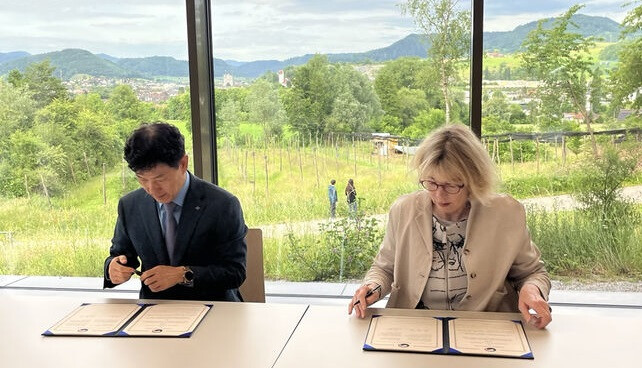
SUWON, SOUTH KOREA / FRICK, SWITZERLAND – The National Academy of Agricultural Science (NAAS), an affiliate of South Korea's Rural Development Administration (RDA), and the Research Institute of Organic Agriculture (FiBL) in Switzerland officially signed a Memorandum of Understanding (MOU) on May 28 to collaborate on the advancement of regenerative organic agriculture. This partnership marks a significant step towards bolstering the competitiveness of organic farming practices in both nations and globally.
The signing ceremony, held at FiBL's headquarters in Frick, Switzerland, was attended by key representatives from both institutions. Lee Sang-jae, Director-General of the Agricultural Environment Department at NAAS, and Beate Huber, Deputy Director of FiBL's Executive Board, along with researchers and officials, underscored the mutual commitment to sustainable agricultural development.
FiBL stands as a pivotal global institution in organic farming research. It is renowned for its extensive work on sustainable agricultural development through organic methods, with a focus on critical areas such as climate change adaptation in organic agriculture, organic soil management, and organic pest and disease control. Its research outputs and policy recommendations have significantly influenced organic farming practices worldwide.
Under the terms of the MOU, NAAS and FiBL have committed to several key areas of cooperation:
Joint research and collaboration: Focusing on areas of mutual interest including organic agriculture and broader sustainable agricultural practices. This will likely involve sharing methodologies, data, and findings from ongoing projects.
Expansion of human exchange: Facilitating mutual visits between researchers and experts to foster knowledge transfer, collaborative project development, and capacity building. This could include long-term research secondments or short-term expert consultations.
Promotion of international collaborative research: Working together on joint projects that address global challenges in organic farming, potentially seeking funding from international bodies and involving other partner organizations.
Director-General Lee Sang-jae emphasized the strategic importance of this collaboration for South Korea. "This MOU extends beyond mere inter-institutional cooperation; it will serve as a practical foundation for strengthening the competitiveness of regenerative organic agriculture in Korea," he stated. Lee further highlighted the intent to "understand global trends in organic agriculture with FiBL and reinforce international cooperation to revitalize domestic regenerative organic agriculture."
The Growing Importance of Regenerative Organic Agriculture
The collaboration comes at a crucial time when regenerative organic agriculture is gaining increasing global attention. This approach goes beyond conventional organic farming by focusing on holistic land management practices that aim to reverse climate change by rebuilding soil organic matter and restoring degraded soil biodiversity. Key principles often include minimal soil disturbance, cover cropping, diverse crop rotations, integrated livestock, and reduced reliance on external inputs. Proponents argue that regenerative practices can sequester carbon in the soil, enhance water retention, improve nutrient cycling, and increase farm resilience in the face of extreme weather events.
For South Korea, which has a relatively smaller land area and faces challenges related to food security and environmental sustainability, adopting advanced regenerative organic practices is vital. The country has been actively promoting eco-friendly agriculture, and this partnership with FiBL, a leader in the field, is expected to accelerate the development and adoption of innovative techniques suitable for local conditions. It can provide NAAS with access to FiBL's long-standing expertise in research on soil health, biodiversity, and integrated farm systems within an organic framework.
FiBL's role in this partnership is equally significant. As a pioneer in organic research for over 50 years, the institute has a vast knowledge base and a network of global partnerships. Collaborating with NAAS allows FiBL to extend its influence and apply its research findings to diverse agricultural contexts, particularly in Asia, where sustainable agriculture development is a priority. It also provides an opportunity to test and refine existing organic models under different climatic and socio-economic conditions. FiBL’s ongoing projects include long-term field trials comparing organic and conventional systems, research on new organic breeding techniques, and studies on socio-economic aspects of organic food systems. The institute's commitment to "knowledge transfer" ensures that research findings are practically applicable for farmers and policymakers.
Future Implications and Broader Impact
The partnership is expected to lead to several tangible outcomes. Joint research projects could focus on developing region-specific regenerative organic farming systems tailored to Korean agricultural landscapes, optimizing nutrient management for organic crops, and improving pest and disease control strategies without synthetic chemicals. There could also be collaborative efforts in developing certification standards or best practice guidelines for regenerative organic agriculture in both countries, contributing to international harmonization in organic regulations.
Furthermore, the exchange of researchers will facilitate direct learning and technology transfer. Korean researchers could gain hands-on experience with FiBL's long-term experimental fields and advanced analytical techniques, while Swiss researchers could explore the unique challenges and opportunities presented by Korean agriculture. This human exchange component is crucial for building long-term research capabilities and fostering a global community of organic farming experts.
Beyond the immediate research benefits, this collaboration could have broader implications for global food systems. By combining expertise, NAAS and FiBL can collectively contribute to scientific understanding and practical solutions for sustainable food production. This international cooperation reinforces the growing consensus that addressing climate change, biodiversity loss, and food security requires a shift towards more resilient and environmentally sound agricultural practices. The partnership serves as a model for how countries can leverage international scientific collaboration to achieve national sustainability goals and contribute to a more sustainable future for agriculture worldwide.
[Copyright (c) Global Economic Times. All Rights Reserved.]






























